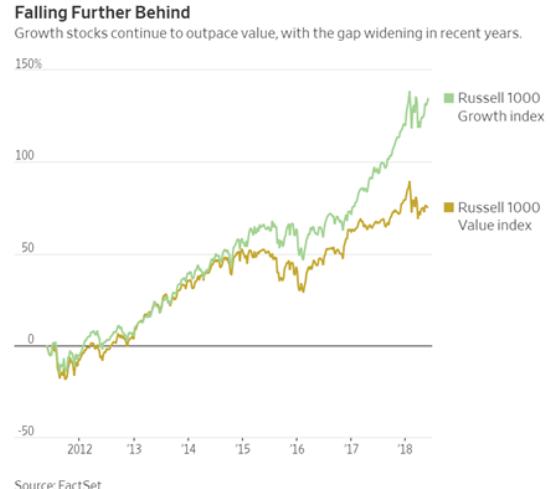Back in the late 1990s I interviewed for an analyst job with a value-oriented money manager. My main impression of our talk was how sad the guy was. The tech bubble was in full swing, any little nothing company with even a tangential relationship to the Internet was soaring, and this poor guy’s cash-rich, super-safe stocks were lagging so far behind the market averages that it was hard to see how he kept a single client.
Fast forward to today, and his value investing successors are in that same boat, underperforming their tech stock counterparts day after day and wondering how to keep from sinking without a trace. From today’s Wall Street Journal:
Value Investors Face Existential Crisis After Long Market Rally
Hunting for cheap stocks has been out of favor for so long that some self-proclaimed “value” investors are embracing a broader mandate, a potentially costly move in the later stages of an economic cycle.
Many such buyers have drifted away from the hallmark of value investing championed by the likes of Benjamin Graham and Warren Buffett : actively picking stocks the market has overlooked. Those legendary investors assessed what they called a company’s intrinsic value and compared it with metrics such as its cash flow and price-to-book ratio, a measure of net worth.
Value stocks—traditionally shares of consumer-staples companies, basic materials firms and big manufacturers, among others—have been stuck in a rut for most of the nine-year rally in U.S. stocks. The Russell index of 1,000 of the biggest value stocks in the market has fallen 2.1% in 2018, the fifth straight year—and the 10th of the past 11 years—that the index has lagged behind its growth counterpart, which is up 6.9%.
Some critics say the measures used to identify value have aged poorly in a market dominated by passive investing strategies and asset-light technology companies. Those trends have pushed more investors into the shares of fast-growing companies such as Apple and Netflix that have powered the market higher in recent years. Other investors have turned to studying momentum trading, crowded positions, fund flows and event-driven trading, strategies not typically associated with value investing.
“One of the toughest things is being able to articulate what value investing is anymore,” said Laton Spahr, the portfolio manager of Oppenheimer’s value fund. “It’s hard to pinpoint what value investing is today, and that is the hard thing to making it relevant to retail clients again.”
Many investors say they aren’t looking back, even as most analysts generally agree the U.S. is in the later stages of an economic cycle. That would suggest stocks are due for a pullback, putting investors who have altered their strategies at risk of missing out if the pendulum swings back in favor of traditional value stocks that historically shine when the broader market is under pressure.
Perhaps one of the more controversial changes among value investors is the drift toward growth companies. Value investors who justify buying shares of Amazon.com or Netflix, for example, say it is because those companies are still undervalued by the broader market, despite their big revenue growth. Others call it portfolio window-dressing to boost returns.
Eddie Perkin, chief equity investment officer at Eaton Vance , said value funds that have ignored the hugely popular FANG stocks—Facebook, Amazon, Netflix and Google parent Alphabet Inc. —run the risk of being left behind in the market.
“The FANG stocks are so dominant in those benchmarks that to not own them, you got really hurt the last few years,” he said. So you had to have those in your portfolio to keep up with other growth managers.”
Eaton Vance’s Large-Cap Value Fund, which has been in existence for more than 80 years, is tilted toward financial stocks such as JPMorgan Chase but also counts a position in Alphabet.
If this sounds familiar, it’s because late-cycle markets frequently end with hot money chasing what’s been going up, widening the gap between growth and value and forcing value managers to choose between extinction via customer redemptions or adaptation (buying growth stocks or otherwise embracing greater risk) – at exactly the time that their original strategies are set to pay off big-time.
Post-bubble crashes always favor value over growth. Unfortunately, only a relative handful of value managers are still there to enjoy the vindication.



4 thoughts on "Late-Cycle Sadness: Value Investors Give Up And Buy Netflix, Apple"